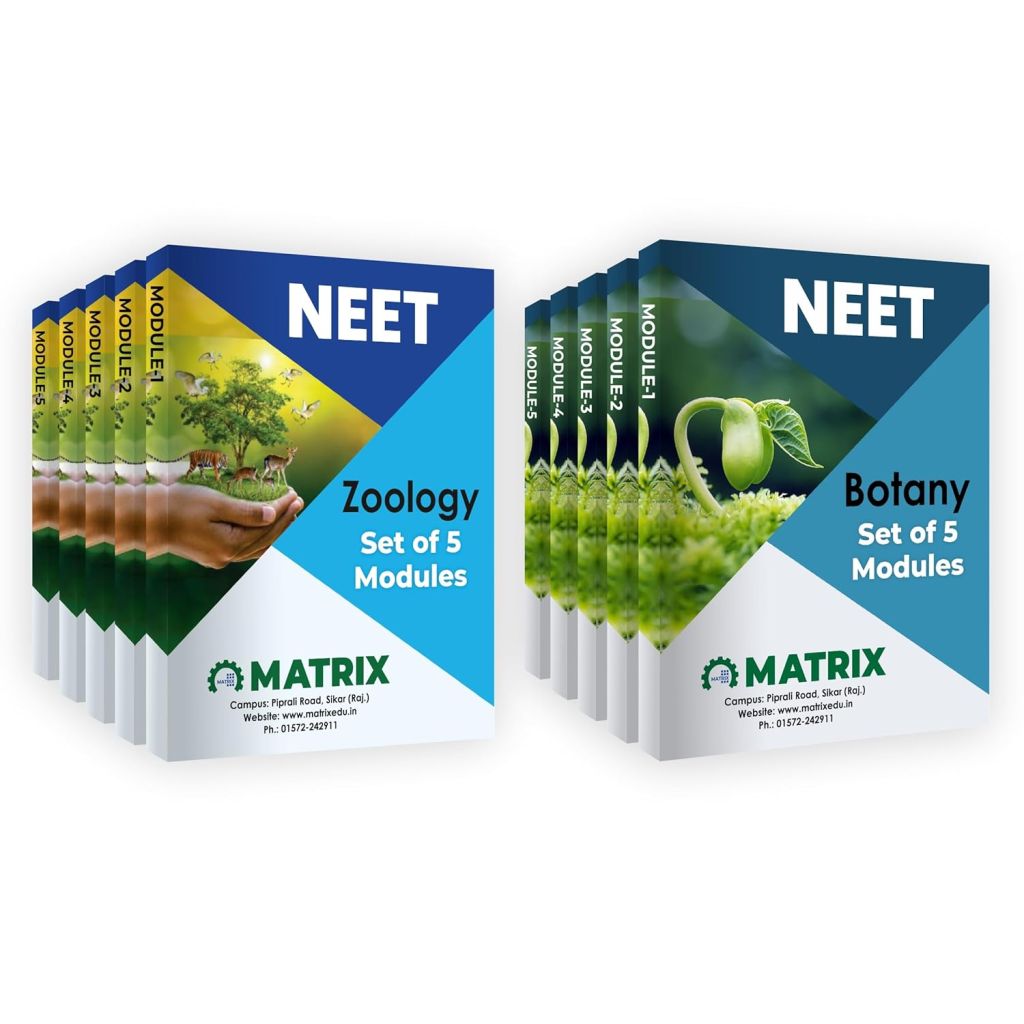
How to Prepare Biology for NEET UG 2026?
NEET Biology preparation is not only based on memorising facts, but it also depends on mastering scientific reasoning and exam-specific strategies. Matrix Academy NEET Biology preparation is specifically based on mastering scientific reasoning and exam-specific strategies by offering comprehensive study materials, personalised guidance from expert educators, a well-prepared question bank, and a data analytics platform to analyse your performance.
Matrix Academy’s Biology preparation approach is based on a concept-to-practice methodology that ensures an in-depth understanding, real-time performance insights, and regular reinforcement of Biology’s two areas: Botany and Zoology. The blog will offer you a structured approach suggested by Matrix Academy for mastering both Botany and Zoology, for scoring maximum in the Biology section of NEET UG 2026.
Overview of Biology in NEET UG 2026
Biology carries 50% weightage in the NEET UG exam with a total of 90 questions, which makes it a high-scoring subject. NEET UG Biology is mainly divided into two major subjects: Botany and Zoology. Matrix expert educators identified that approximately 60 to 70% of test questions can be solved by understanding concepts and using diagrams, not just memorising facts. The preparation for NEET Biology can be improved by considering the following factors-
- Deep conceptual clarity: You should not only focus on covering definitions, but also on mechanisms, reasoning, and applications.
- Diagram-based fluency: Focus on developing the ability to accurately label, interpret, and reproduce diagrams. Diagrams are a crucial part of NEET Biology questions.
- High-speed accuracy: You should allocate 50 seconds (approximately) per question, because smart elimination and time management are important aspects.
- Revision & practice: Review your main facts regularly so you know at least 95% of important information in the final exam.
Matrix Academy expert faculty develop their study methods and lessons as per the above requirements by integrating weekly diagnostics, micro-tests, and customised remedial plans to ensure each student remains on track to score high.
How to Prepare Biology (Botany & Zoology Combine) for NEET UG 2026?
Preparing for Biology can be done by dividing your attention equally to each subject. The approach should be based on combining regular practice, efficient time management, and expert guidance by covering both sections of NEET Biology. Your focus shall revolve around gaining the maximum knowledge out of each subject of Biology, i.e., Botany and Zoology. We will individually see the strategies suggested by Matrix educators to prepare for biology for the upcoming NEET UG 2026 Exam to get maximum marks in this subject.
1. Balanced Time Allocation
Matrix Academy suggests that you should allocate a balanced study plan, which allows students to alternate between topics from both branches by ensuring comprehensive preparation.
2. Interlinking Concepts

At Matrix Academy, we encourage our students to create an interlink between Zoology and Botany, which helps in reducing time. For example, understanding human physiology (Zoology) helps in improving the physiology of plants (Botany). For this, Matrix educators frequently organise after-class sessions that interlink both subjects to enhance overall retention and conceptual clarity.
3. Regular Assessments
You should participate actively in the regular tests conducted by Matrix Academy. Every week, Matrix conducts real situation-based practice tests by covering all the sections of Zoology and Botany. The primary goal is to check accuracy, speed, and understanding of these topics. The motive behind organising these tests is to ensure that students are continuously evolving during their preparation journey, where they can track their progress in real time. After completion of 2 or 3 weeks, you can participate with a full Biology paper by including 100 questions (50 Zoology + 50 Botany) within 1.5 hours.

How to Prepare Botany for NEET UG 2026?
Botany is a branch of biology that covers the study of plants, their functions, structure, reproduction, and evolution. Expert faculties at Matrix Academy suggest that your preparation should be around the NCERT books, which is why they implement this approach in their classroom study method as well.
The following strategies are suggested by Matrix Academy to help students in their Botany preparation:
1. Building a Strong Conceptual Foundation

At Matrix Academy, we clearly know the value of understanding core concepts before the process of memorisation. Matrix expert educator Arihant Jain Sir breaks down complex topics such as morphology, Ecology, Genetics, and Physiology by making them easier to understand. Arihant Sir frequently organises weekly/daily regular concept revision sessions with dedicated doubt counter sessions to ensure that students remain doubt-free during their studies.
2. Focused Topic-wise Approach/ Curriculum Mapping & Core Units
Botany is a wider subject, where every topic has its own weightage. Arihant Jain Sir designed a specific, structured study plan, which is based on his 11 years of teaching journey. This plan covers all the Botany topics by offering extra attention to the important ones. The following are some chapters suggested by Arihant that students should prioritise in their preparation-
| Module | Duration | Focus Areas |
| Plant Kingdom to Morphology | 3 Weeks | Algae to Angiosperms, Structure, and Evolution |
| Plant Physiology | 4 Weeks | Photosynthesis, Respiration, Hormones, and Transport |
| Reproduction & Genetics in Plants | 2.5 Weeks | Flower Structure, Pollination, Mendelism in Plants |
| Ecology, Biotechnology & Environment | 1.5 Weeks | Plant ecology, Biotechnological applications, and Biodiversity |
| Cell Structure and Function | 1-1.5 Week | Cell Organelles, Transport, and Signaling |
3. Practising Diagram-Mastery Labs
The recent years’ pattern in NEET exams confirms that Physiology, Anatomy, and Morphology diagrams have continuously appeared in the final exam papers. Arihant Sir organizes Botany Diagram practice labs, where students design their own vascular bundles, stomatal apparatus, rhizoids vs root hairs diagram by discussing it with peers. At Matrix, students are trained with speed label drills by ensuring they make quality decisions within a specific time during the final exam. Matrix-designed unique recall sheets are a summary of all Botany diagrams in one-page visuals for rapid pre-test review.
4. Question Bank & Practice Schedule

Your Botany preparation can be rapidly improved with the specific book designed by Matrix Academy, which combines 11th and 12th class-based 900+ PYQs & 1900+ MCQs. The goal of this book is to improve conceptual practice, based on various difficulty levels and repetitive concepts. Arihant Sir suggests students should regularly attempt: three sets of 30 questions per week, by allocating 50- 60 seconds per question. You should register your mistakes in your own diary/register, where our educators assign targeted re-tests on these weak topics until you become an expert. You can easily buy online Matrix NEET Botany Books directly to begin your studies today.
How to Prepare Zoology for NEET 2026?
Zoology is another crucial subject in NEET biology with equal weightage as Botany. Matrix Academy suggests that Zoology preparation can be improved with application-based learning, exact curriculum mapping, and MCQ-based intensive practice.
You can follow the below-mentioned personalised strategies suggested by Matrix Academy as follows-
1. Application-Based Learning
Matrix Academy students consider Zoology as a practical application subject, rather than only focusing on theories. For example, Matrix Academy teaches its students genetics with the approach: how to apply learned concepts to solve real exam problems. Matrix Zoology educator Dr Abhinav Badhaniya (8+ years of experience) teaches students with Concept→ Note → Application method. By using the method which is revolving around preparing notes for NEET UG exam, he teaches concepts of any specific topics first, pushing students to convert them into their personal notes, and then applying them in attempting Zoology questions. Thus, students effectively create their theoretical base and use it to solve application-based questions in the NEET exam.
2. Curriculum Mapping & Core Subjects by Sanwar Sain Sir
Matrix faculty expert Sanwar Sain creates a well-developed curriculum map by covering important areas to consider. Sanwar Sir shares a personalised Zoology roadmap with the students. Some important key areas to consider for NEET Zoology are as follows-
| Module | Duration | Focus Areas |
| Animal Kingdom to Basics | 3 weeks | Classification, Protista to Chordata, evolutionary trends |
| Human Physiology & Endocrines | 4 weeks | Systems, homeostasis, hormones, pathophysiology |
| Reproduction & Genetics | 2.5 weeks | Mitosis, meiosis, inheritance, reproductive health |
| Ecology, Ethology & Biotech | 1.5 weeks | Ecosystems, behaviour, and biotechnology applications |
| Structural Organisation of Animals | 2-3 weeks | Animal tissues, body cavities |
3. Expert-led Concept Sessions by Sanwar Sain & Abhinav Badhaniya Sir

One of the most effective ways to improve Zoology preparation is by attending interactive classes organised by our expert educators, which are based on the concept of answering why and how over what. Our educators engage students by arranging quick-concept quizzes and reinforcing logical connections. For example, if the glomerular filtration rate decreases, what compensates in the proximal tubule?
4. MCQ-Based Intensive Practice:
At Matrix Academy, performance analytics plays an important role in improving Zoology preparation. Matrix analytical system identifies weak areas by generating personalized, customised remedial sessions for the students. Students also use their personal dashboard to track progress, error types (conceptual, careless, time-loss), and corrective actions. Like Botany, Matrix also offers NCERT-based NEET Zoology modules, a combination of 500+ PYQs & 1050+ MCQs. This book is developed with a chapter-wise design approach, aligning with the NEET syllabus. For example, you can practice a 30-minute timed Micro-Test of 25 questions to improve your accuracy. You can easily buy online Matrix NEET Zoology Books directly to begin your studies today.

Performance analytics parameters suggested by Matrix educators clearly highlight the weak areas in Zoology chapters. Based on this, customized and personalized remedial classes are created by offering extensive practice materials designed to cover these issues.
5. Revision for Quick Recap & Memory-Recall
Revision ensured high-quality performance in a subject. You can participate in a 1-hour revision session after the completion of each unit, which offers you an instant solution to your issue. This revision session should be based on rapid whiteboard challenges, solving 50 facts, and discussing results with peers. You should practice memory recall techniques like storytelling, concept maps, and mnemonics, which help in improving long-term retention. For example, you can learn about the endocrine pathways by using an animated video instead of simple bullet points.
Matrix Academy’s Specific Tips to Score Full Marks in NEET Biology?
Scoring 180/180 marks in NEET Biology is definitely achievable with the right guidance and consistency. You can achieve this goal by taking assistance from Matrix Academy. Some tips suggested by Matrix Academy to score 180/180 in Biology are as follows-
- You should complete the 100% NCERT syllabus in a time period of 3 months. At Matrix, we offer you internal modules and weekly quizzes to track your performance.
- You should aim for 95% accuracy during your practice by attempting 20 MCQs daily within an 18- to 20-minute time span.
- Every mistake should be registered in your diary/log. After this, you should review your log monthly by discussing it with peers or expert educators to eliminate any scope for mistakes.
- Revision is a key factor in scoring good, where you should constantly revise practice questions of both subjects to build speed. You can also take assistance from your notes in the initial days, but over time, you have to attempt these tests without any assistance. Your revision for Biology can be improved with practice of making NEET Biology Notes for quick revisions of the complex topics.
- You can also improve biology performance by prioritizing high-weightage chapters of NEET. These high-weightage chapters are prepared by Matrix Academy’s experienced faculty to support you in subject task prioritization.
Conclusion
NEET Biology preparation can be improved with the implementation of regular practice, conceptual clarity, and focused revision. At Matrix Academy, we implement a concept-to-practice approach, performance analytics, and guidance from expert faculty by ensuring that each student will receive equal attention for both areas of Biology: Zoology and Botany. You have to maintain a balance between Zoology and Botany by balancing time, regular assessment, and interlinking topics. This practice helps students to develop positive confidence, speed, and precision.
FAQs
You can start your Biology preparation by starting with the NCERT-based study material, primary focus on conceptual clarity, and regular revision of the topics. Matrix Academy expert educators suggest that you should follow a structured timetable by creating a balance between Botany and Zoology with weekly tests and targeted improvement sessions.
Experts at Matrix Academy suggest that Botany preparation must start by creating a base with NCERT books, practising diagrams regularly, and strengthening conceptual understanding. You can also use Matrix-designed topic-wise modules, question banks, and revise using recall sheets for faster visual retention of the topics.
The NEET Zoology preparation can be improved with the implementation of application-based learning and conceptual understanding. You can take assistance from Matrix-designed question banks, expert educator sessions, and engage frequently in tests to strengthen the human physiology, genetics, and reproduction chapters.
Expert educators at Matrix believe, approximately 60-70% Biology questions are based on diagram-based interpretation. Regular diagram practice helps in boosting retention, speed, and accuracy during exams.
NEET Biology can be best revised with the use of concept maps, concise notes, and one-page visual summaries. You should attempt weekly time quizzes, peer discussions to reinforce memory recall and quick concept application.
To score 180/180 marks in Biology, you should cover the NCERT syllabus, tracking and revising mistakes, practising 20 MCQs daily, and topic prioritisation. You should maintain consistent accuracy and participate in full-length mock tests regularly.




